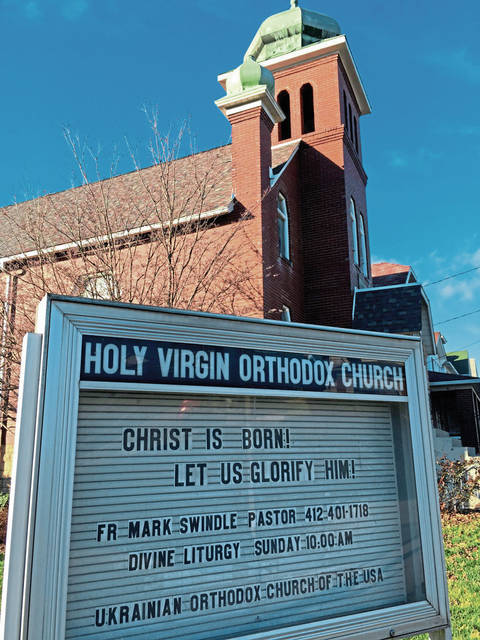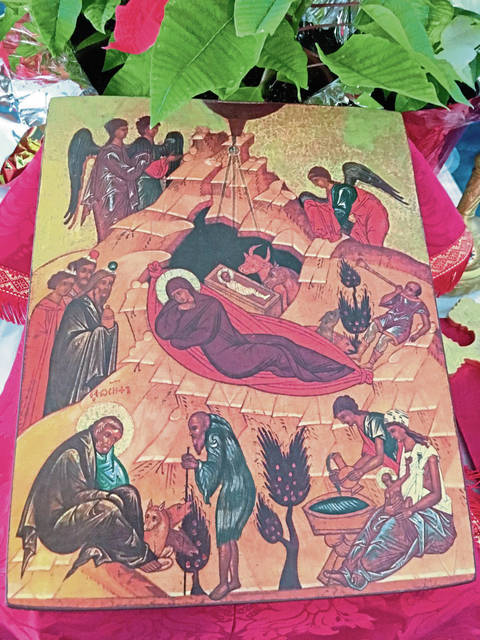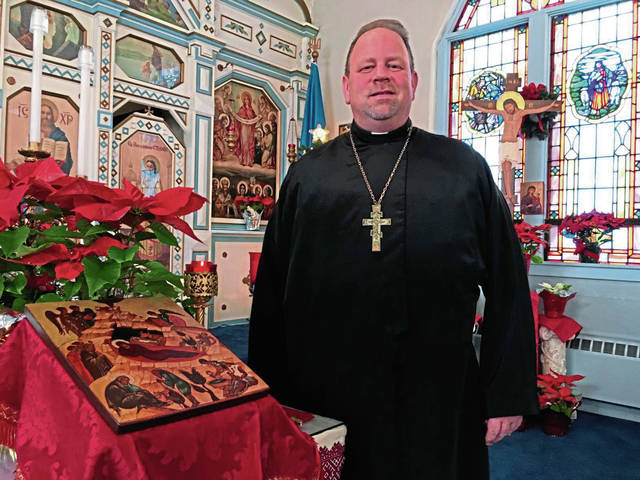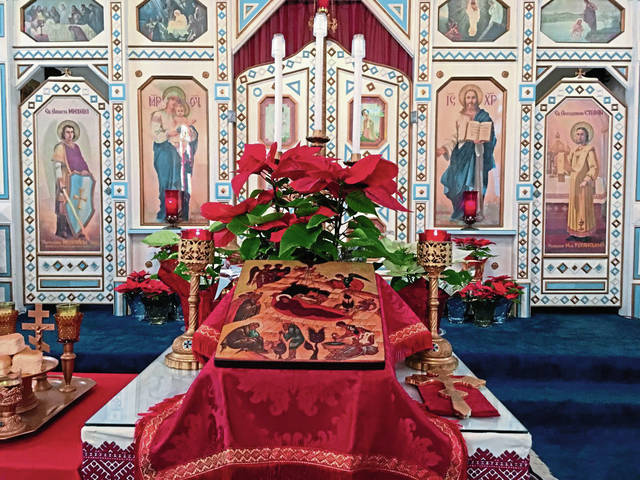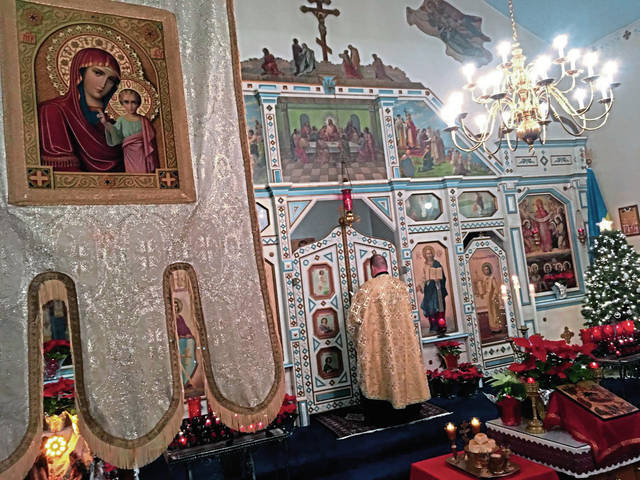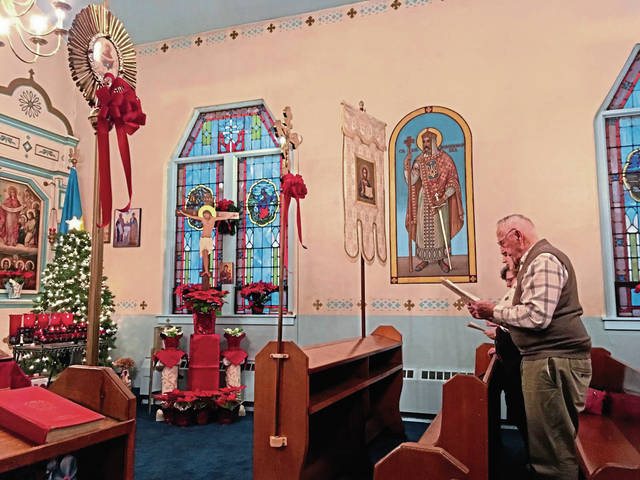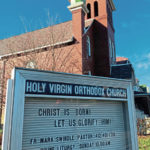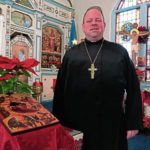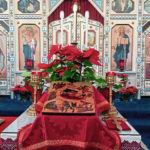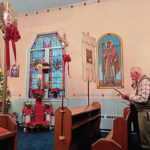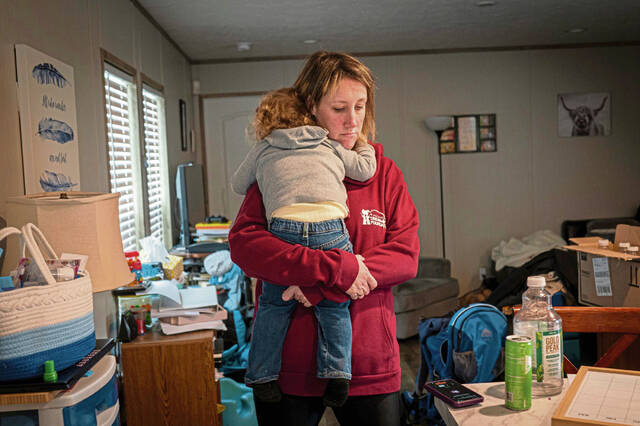For Homer Kline, there’s a meaningful advantage to observing Christmas on Jan. 7 instead of Dec. 25.
“The 7th is strictly religion,” said Kline, 85, of Murrysville, a member of Holy Virgin Ukrainian Orthodox Church in Arnold since he was married there in 1954. “It’s easier to concentrate on the birth of Christ on the 7th without all of the commercialization.”
Kline and his wife, Nadia, are among the 25 members of the church led by the Rev. Mark Swindle. They gathered for Christmas Eve services twice on Sunday, in the morning and early evening, and will be there to observe Christmas on Monday.
Other than St. Nicholas Day on Dec. 19, when presents were opened, Orthodox Christians had not yet celebrated any holy days this holiday season.
“We like to have our quiet time now,” he said. “The rest of the world has celebrated their Christmas on Dec. 25 and the parties and all the carols and everything that goes along with that, all the sales in the stores. We now come to this quiet time where we as Orthodox Christians contemplate Christ’s birth and put that meaning really back into Christmas and what it’s all about.
“In America, it is kind of difficult to celebrate both,” he said. “We are Ukrainian Americans, so many of us are intermarried within our parishes nowadays where we have American-born spouses or family that’s American.
“We celebrate almost sometimes two holidays. This one, the Orthodox Christmas, is a very solemn time for gathering to church and gathering with family and friends to celebrate what we believe is the true meaning of Christmas, which is Christ’s birth.”
Calendar difference
Many Orthodox Christians in the United States celebrate Christmas Day on Jan. 7.
The majority of Orthodox churches worldwide use the Julian calendar and have not adopted the Gregorian calendar, which as been in use for centuries in Western nations. There is a 13 days’ difference between the calendars: New Year’s Day on the Julian calendar falls on Jan. 14.
Dec. 25 on the Julian calendar falls on Jan. 7 on the Gregorian calendar, Swindle said.
“So strictly speaking, Christmas is still kept on Dec. 25, which just happens to fall 13 days later on the Julian calendar,” he said.
Contrasting customs
The Orthodox observance of Christmas contrasts considerably from Western customs, according to Swindle.
Orthodox Christians have an Advent season, from Nov. 28 to Jan. 6, which is a time of fasting and performing deeds of charity.
“Many observe the 40 days leading to Christmas as a way to renew their faith and relationship to God,” Swindle said.
The Christmas holiday is spread over three days and includes various fasts and services of worship, beginning with a service on Christmas Eve morning. A fast is kept throughout the day until sunset and the appearance of the first star at evening, where a special meat- and dairy-free meal called the “Holy Night supper” is eaten, and carols are sung.
That is followed by a Nativity vigil and “Grand Compline,” consisting of psalms and prophesies being read and those present being anointed with fragrant oil blessed for the occasion.
“Holy Virgin Parish is blessed to have the Holy Supper together as a ‘parish family,’ and all parishioners and friends are invited to this supper so nobody has to be alone on this Holy Evening,” Swindle said.
They return Christmas Day for a service called the Feast of the Nativity, in which the Divine Liturgy is served.
On the final day, the day after Christmas, church services and celebrations honor the Virgin Mary for her role in the Nativity story.
“Orthodox Christians still do the exact same things as any other person would do to celebrate Christmas,” Swindle said. “We enjoy decorating Christmas trees, hanging wreaths, singing carols and exchanging gifts. However, there is an increased emphasis on the spiritual reality of this truly miraculous holy day.”
East versus West
According to Swindle, the Roman Catholic Church believes in the infallible teaching authority of the church — the doctrine of papal infallibility.
“This is a concept foreign to the Eastern Orthodox, who see the authority of the church as stemming from the Holy Tradition, seen most fully in the Ecumenical Councils,” Swindle said.
For Roman Catholics, it means participation in the organization headed by the Pope.
For the Orthodox, it means membership in one of the Orthodox churches, which are fully in communion with one another and is headed by the Ecumenical Patriarch located in ancient Constantinople, modern-day Istanbul, Turkey.
Issues which contribute to the continuing division between the Orthodox and the Catholics:
• Liturgy: The Roman Catholic Mass is different from the Orthodox Divine Liturgy.
• Married clergy: In the Roman Catholic Church, priests may not be married. For the Eastern Orthodox, married men may become priests, but not bishops.
• Bread and the Eucharist: Roman Catholics typically use unleavened bread, or wafers, whereas the Orthodox use leavened bread. This is because of an old dispute about the precise date of Easter, and whether the Last Supper was a Passover meal.
Blessing of bread, wheat, wine, oil
The service of Litya in the Orthodox Church is beautiful and rich with meaning and grace, but is a service too-seldom served, Swindle said.
In the ancient church, people most often brought offerings of bread and wine to the church. The best were set aside for use in the Holy Liturgy; the rest was blessed and distributed among the poor, orphans, widows, sick and all those in need.
“The church reached out to the helpless in a very real and tangible way by helping to feed them,” Swindle said. “The poor weren’t even ‘tricked’ into the temple; the blessing was done outside, so those in need could obtain the help they needed regardless of whether they went to church or not.
“It’s good for us to remember that the life of the church does not exist only in the temple — we’re to take the truth of the gospel, the love of Christ, into the world and share it with those in need,” Swindle said. “And we’re not to only share a good word, but we’re called by our Lord to offer tangible help to those in need if we are able.
“When we serve the Litya, in the prayer of the blessing of the loaves, we ask God to bless this food and multiply it for those in need, and also to bless this place where we live, and the people who live in it,” Swindle said. “We offer bread, wheat, wine, and oil, and in return God blesses them and offers us and all of those around us the chance to share in His life.”
Brian Rittmeyer is a Tribune-Review staff writer. You can contact Brian at 724-226-4701, brittmeyer@tribweb.com or via Twitter @BCRittmeyer.


